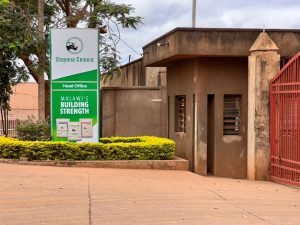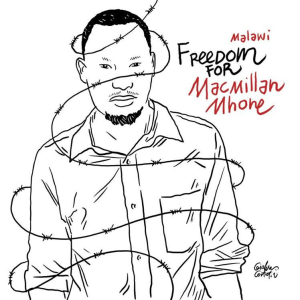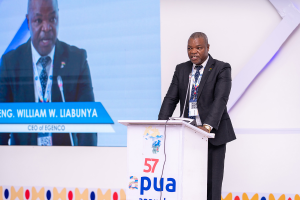COULD THE HISTORIC CASE OF A TRANS SEX WORKER END MALAWI’S ANTI-LGBTIQ LAW?
A High Court appeal could have huge implications in the fight for LGBTIQ rights

South African human rights activists protest at Home Affairs Offices, against homosexuals imprisoned in Malawi, under Malawi's anti-gay laws, which date from the colonial era, May 20, 2010, Cape Town.| Nardus Engelbrecht/Gallo Images/Getty Images
BY JOSEPHINE CHINELE & KHATONDI SOITA WEPUKHULU
As Jana Gonani hurried past security guards to meet her visitors, her chequered shirt was half open, showing off a multicoloured necklace.
“I just like the necklace because the peace colours resemble rainbow colours, the colours that show who I am. I have no intention to hide my identity even whilst here in prison,” she said in an interview with openDemocracy and PIJ in November.
Imprisoned in December 2021, Gonani, a 29-year-old Malawian trans woman, is currently serving an eight-year sentence at Chichiri men’s prison in Blantyre City for two counts of “false pretence” and one count of “unnatural offence” – both crimes under Malawi’s Penal Code.
Gonani, a sex worker at the time of her arrest, was charged by the public prosecutor with the offence of obtaining [goods] under “false pretence” after a client who had sex with her twice in one evening later accused Gonani of “falsely representing [herself ]as a woman.” The client was not charged with the “unnatural offence”.
In February 2022, with the help of Nyasa Rainbow Alliance (NRA), a Malawian LGBTIQ organisation, Gonani filed an appeal in the High Court to challenge the constitutionality of Section 153 of the country’s Penal Code pertaining to “unnatural offences”, a British colonial legal term that includes homosexual sex.
Significance of the Case
This is the first time the “unnatural offence” law – Malawi’s only anti-homosexuality legislation – has been legally challenged on its constitutionality, making Gonani’s case a significant one in the fight for LGBTIQ rights.
Unlike in Ghana, Uganda and Kenya, there has been little effort in the Malawian parliament to introduce new anti-gay laws (in the near future). It did visit the Ugandan parliament in July, where they praised its anti-homosexuality law passed this year. Other notable MPs who were on this trip include Government Chief Whip Jacob Hara and Second Deputy Speaker Aisha Adams.
Speaking to openDemocracy, NRA lawyer Ousman Kennedy said the organisation’s support for Gonani’s case was driven by the belief that: “[A] law that criminalises same-sex relations between two consenting adults in private serves no useful purpose other than fuelling the harassment and discrimination of LGBTI persons in Malawi.”

George Hopkins Kachimanga, executive director of the LGBTIQ-focused Social Justice Foundation, told openDemocracy homosexuality being criminalised in Malawi has made queer advocacy difficult.
“In most situations, we are limited in providing a safe space including for speaking out on LGBTIQ issues because we are restricted by the criminalisation of same-sex sexual acts,” he said.
A 2018 report by Human Rights Watch found that Malawi’s criminalisation of same-sex conduct leaves LGBTIQ people vulnerable to arbitrary arrests, physical violence and routine discrimination.
For Gonani, this legal challenge is an opportunity, she says, to seek “justice being done to my case and the people who are like me.”
“There are many human rights violations on me and LGBTQ people in this country,” she added.
For Prince Mikel, a trans man and Malawian LGBTIQ activist who first met Gonani in 2017, the case also creates a space to advocate for transgender and sex worker rights in Malawi.
“It’s an opportunity for advocacy around gender recognition because the penal code has been silent about gender recognition, and yet most times trans people are criminalised based on their sexual orientation,” said Mikel. He also said trans sex workers are blackmailed by clients because of their gender identity. Gender identity refers to a person’s innate, deeply felt psychological identification as a man, woman, or another category. This may or may not correspond with the sex a person was assigned at birth. Sexual orientation is the preferred term used when referring to an individual’s innate romantic, sexual, and/or emotional attraction to other people with regard to sex and/or gender. “Heterosexual,” “bisexual,” “pansexual,” “asexual,” and “homosexual” are all examples of sexual orientations. A person’s sexual orientation is distinct from a person’s gender identity and expression.
Legal Issues Raised
According to the NRA, when Gonani was arrested in October 2021, she was subjected to a strip search by the police to establish her sex. She was also forced to undergo a mental health assessment on account of her gender identity.

Gonani’s lawyer, Bob Chimkango, told openDemocracy the legal action deals with three issues: that the strip search and medical examination violated Gonani’s right to privacy and human dignity, that Gonani did not consent to the search, and that the law on “unnatural offence” does not meet “sufficient particularity” in its meaning.
Regarding the last point, Chimkango explained: “Our constitutional dispensation says that a person who is accused of an offence should be given every detail of what they are being accused of. We noted that in the Gonani case, this was not done.
“Whether they had oral sex, anal sex or vaginal sex, [what] the accused did that is actually against the law of nature [must be made clear], which was not done for Gonani.”
Combining Gonani’s Case With That Of A Suspected Sex Offender
Gonani’s legal challenge has not been without its hiccups.
In 2023, the High Court merged Gonani’s petition with that of another petitioner, Wiliam Akster, a Dutch national who was charged with nine counts of sexual abuse against youths, most of them young men in their 20s. At the time of his arrest in 2020, Akster was the head of Timotheos Foundation, a Dutch church aid organisation working with vulnerable children in Malawi.
Akster’s petition challenged the constitutionality of the “unnatural offence” law on the basis that his sexual encounters with the alleged victims were consensual. The law in question criminalises even consensual same-sex acts between adults.
Chikango explained that the court made Gonani a second petitioner on the case and “consolidated the two, saying they are dealing with the same issue, so we can’t have two parallel courts making different decisions.”
However, the merging of the two cases has caused anxiety and worry among some LGBTIQ organisers about how it is likely to worsen the perception of sexual minorities and gender-diverse people in the country.

Micheal Kaiyatsa, the executive director of the Centre for Human Rights and Rehabilitation (CHRR), a top human rights organisation in Malawi, told openDemocracy that the consolidation of the petitions “is likely to complicate the advocacy and gains already made on the issues” raised. CHRR is an amicus curiae on the Gonani case – a Latin term that means “friend of the court”. This refers to an individual or organisation that is not party to the case but is permitted to submit information to aid the court in reaching its decision.
“These are two different cases because Akster’s case involves sexual abuse. There is a high risk that the court may merge a general judgment, which may have a negative impact on the other case (Gonani’s case). I hope the court will be able to isolate issues in its judgment.” Kaiyatsa said.
For Mikel, Akster, a white man, to be presented as the “forefront of advocating for LGBT rights” in the court case feeds the false “perception of our people that homosexuality was imported.”
“I have seen comments on social media where some people say, ‘just send that person back to their country’. It has put activists in a fix because white supremacy and Black authenticity have always been at the centre of the fight for LGBTIQ rights [in Malawi],” he added.
Regarding the merger of cases, Gonani said: “I don’t feel good about having my case merged with another one deemed different… but this is way beyond me.”
Chikango said if the High Court finds the “unnatural offence” law unconstitutional, the two petitioners’ cases will be sent back to their respective lower courts of origin for review.
Anti-Rights Backlash
Even before the two cases were combined, there was intensified backlash from anti-LGBTIQ rights groups regarding Gonani’s petition.
In July, some religious groups staged anti-LGBTIQ protests ahead of Gonani’s case, in which they denounced same-sex marriages – despite Gonani’s petition making no mention of this issue.
“The issue of the legalisation of same-sex marriage has been raised by the faith community in relation to the case for the purpose of intensifying public anger over the case. This was their strategy to suppress the real issues that the applicants had raised in court,” said Khenzi of the NRA.
Khenzi also said that in June, NRA offices were broken into and trashed, and office property, including computers, was taken. He suspects this was in connection to the organisation’s involvement in the Gonani case, which has, on average, also “escalated cases of violence and harassment of activists in Malawi.”
Gonani, a practising Muslim, said those within her faith and others should just accept the way she is. “I am a human being just like anybody else,” she said. “It hurts me to hear that religious leaders and other faith groups seem to be against people like me.”
Even with this backlash, activists are hopeful about the outcome of the case.
According to Chimkango, the arguments in the petition have been completed, and the parties are now awaiting a ruling that may take anywhere between a few to several months.
Although he could not speak to the likelihood of a win, Chimkango said: “We did our job properly, and we are expecting the best from the court.”
“I know I’m not the only trans woman in Malawi or the world. Hence, I want justice to be done in my case and [for other] people like me,” said Gonani.
The story was first published on OpenDemocracy:





